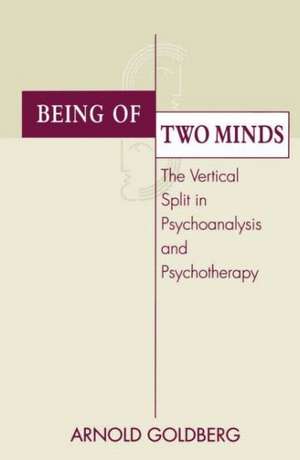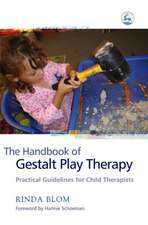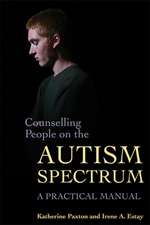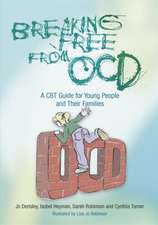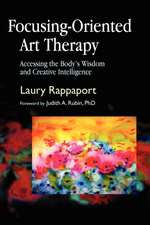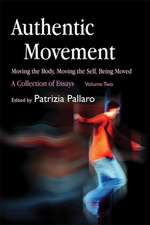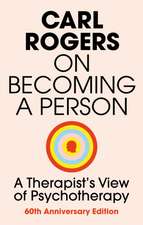Being of Two Minds: The Vertical Split in Psychoanalysis and Psychotherapy
Autor Arnold I. Goldbergen Limba Engleză Hardback – mai 1999
Goldberg's inquiry into divided minds leads to a return to the psychoanalytic concept of disavowal, which forms the basis of the vertical split. Goldberg explores the developmental circumstances that tend to a reliance on disavowal, provides numerous examples of the emergence of disavowal in the treatment situation, and considers the therapeutic approaches through which disavowal may be addressed. He is especially perceptive in discussing the manner in which the therapist's own tendency to disavow may collusively interact with that of the patient.
Goldberg considers the full range of splits to which disavowal gives rise, from circumscribed instances of dissociation to the much-debated multiple personality disorders. He gives special attention to the role of the vertical split in patients with behavior disorders; here his thoughtful insights point to a treatment approach that significantly differs both from the simple ascription of a 'self disorder' and from the usual pedagogical emphasis on issues of self-control and/or punishment. As Goldberg shows, the repugnance felt by many therapists for offensive behaviors emanating from the patient's parallel self are frequently shared by the patient, who commonly despises misbehavior that he is unable to understand. Being of Two Minds begins to formulate just such understanding, to the great benefit of patient and therapist alike.
Preț: 459.17 lei
Preț vechi: 483.34 lei
-5% Nou
Puncte Express: 689
Preț estimativ în valută:
87.87€ • 93.96$ • 73.26£
87.87€ • 93.96$ • 73.26£
Carte tipărită la comandă
Livrare economică 17 aprilie-01 mai
Preluare comenzi: 021 569.72.76
Specificații
ISBN-13: 9780881633085
ISBN-10: 0881633089
Pagini: 200
Dimensiuni: 152 x 229 x 13 mm
Greutate: 0.48 kg
Ediția:New.
Editura: Taylor & Francis
Colecția Routledge
Locul publicării:Oxford, United Kingdom
ISBN-10: 0881633089
Pagini: 200
Dimensiuni: 152 x 229 x 13 mm
Greutate: 0.48 kg
Ediția:New.
Editura: Taylor & Francis
Colecția Routledge
Locul publicării:Oxford, United Kingdom
Public țintă
ProfessionalCuprins
Part I: The Split. Introductory Remarks.The Problem. The Failure of Synthesis: The Phenomenology of the Vertical Split. Collusion and Its Place in the Vertical Split. Psychoanalytic Developmental Considerations. Part II: Treatment and the Vertical Split. Introduction. Commitment and Boundaries. Infidelity: A Prototypical Vertical Split. Specific Treatment Issues and the Vertical Split.Varieties of the Split. Between Empathy and Judgment. Trying on Another Mind.
Recenzii
"Goldberg has once again produced a well-written book of great practical interest and centering on specific clinical problems and case vignettes that nicely illustrate both his point of view and his actual therapeutic practice. I not only highly recommend this book; I consider it mandatory reading for anyone engaging in psychotherapeutic work on a day-to-day basis."
- Richard D. Chessick, M.D., Ph.D.
“In this treatise on the origins, development, and functions of the vertical split in health and illness, Goldberg does for disavowal what Freud did for repression. Being of Two Minds achieves a decisive advance in self psychology and is evidence of Goldberg’s enormous erudition, prodigious reading across a variety of disciplines, and unusual capacity for seamless integration of widely differing sources of knowledge in a quintessentially psychoanalytic manner. This book is destined to become a classic.”
- Paul Ornstein, M.D., Professor of Psychoanalysis, University of Cincinnati
"Arnold Goldberg's new book should be required reading for anyone seeking to understand character disturbances. He convincingly illuminates and illustrates the value of the concept of 'vertical split' for psychoanalytically based treatment. Goldberg writes with such clarity and clinical acumen that the reader can readily apply his ideas to clinical practice."
- Amy Eldridge, Ph.D., Institute for Clinical Social Work, Chicago
“This is a deceptively unassuming book, rare in our field, from an analyst who knows his material so well that he can present it in the clearest of terms. In his effort to elucidate a central tenet in the self-psychological literature, the vertical split, Arnold Goldberg demonstrates, once again, that he is one of our most effective teachers, putting the concept of the split into every terms, illustrating it with succinct clinical problems, and repeating his observations in a variety of contexts . . . we can ask no more of a master teacher than that, by the end of the course, we find ourselves thinking as he does and so can begin to test out his hypotheses for ourselves. This book will do that for you. It is a remarkable accomplishment.”
- Henry F. Smith, International Journal of Psychoanalysis
“In the summary at the end of this splendid volume, Goldberg explains that this is an old-fashioned book. Indeed it is: clear, explicit prose, jargon-free, rich in clinical examples, and drawing on a profound history of psychoanalysis without invoking the latest and most fashionable views in the field. As the title implies, the bulk of the book concerns itself with the vertical split, but it also presents many other observations about psychoanalytic process, technique, and values. . . . Its contents, along with the many rich side ‘essays,’ provide a freshness of thinking combined with a remarkable knowledge of classical psychoanalytic thinking.”
- Harold R. Galef, Psychoanalytic Quarterly
- Richard D. Chessick, M.D., Ph.D.
“In this treatise on the origins, development, and functions of the vertical split in health and illness, Goldberg does for disavowal what Freud did for repression. Being of Two Minds achieves a decisive advance in self psychology and is evidence of Goldberg’s enormous erudition, prodigious reading across a variety of disciplines, and unusual capacity for seamless integration of widely differing sources of knowledge in a quintessentially psychoanalytic manner. This book is destined to become a classic.”
- Paul Ornstein, M.D., Professor of Psychoanalysis, University of Cincinnati
"Arnold Goldberg's new book should be required reading for anyone seeking to understand character disturbances. He convincingly illuminates and illustrates the value of the concept of 'vertical split' for psychoanalytically based treatment. Goldberg writes with such clarity and clinical acumen that the reader can readily apply his ideas to clinical practice."
- Amy Eldridge, Ph.D., Institute for Clinical Social Work, Chicago
“This is a deceptively unassuming book, rare in our field, from an analyst who knows his material so well that he can present it in the clearest of terms. In his effort to elucidate a central tenet in the self-psychological literature, the vertical split, Arnold Goldberg demonstrates, once again, that he is one of our most effective teachers, putting the concept of the split into every terms, illustrating it with succinct clinical problems, and repeating his observations in a variety of contexts . . . we can ask no more of a master teacher than that, by the end of the course, we find ourselves thinking as he does and so can begin to test out his hypotheses for ourselves. This book will do that for you. It is a remarkable accomplishment.”
- Henry F. Smith, International Journal of Psychoanalysis
“In the summary at the end of this splendid volume, Goldberg explains that this is an old-fashioned book. Indeed it is: clear, explicit prose, jargon-free, rich in clinical examples, and drawing on a profound history of psychoanalysis without invoking the latest and most fashionable views in the field. As the title implies, the bulk of the book concerns itself with the vertical split, but it also presents many other observations about psychoanalytic process, technique, and values. . . . Its contents, along with the many rich side ‘essays,’ provide a freshness of thinking combined with a remarkable knowledge of classical psychoanalytic thinking.”
- Harold R. Galef, Psychoanalytic Quarterly
Descriere
In Being of Two Minds, Arnold Goldberg provides trenchant insight into such divided minds - their origins, their appearances, and their treatment. Goldberg's inquiry into divided minds leads to a return to the psychoanalytic concept of disav
